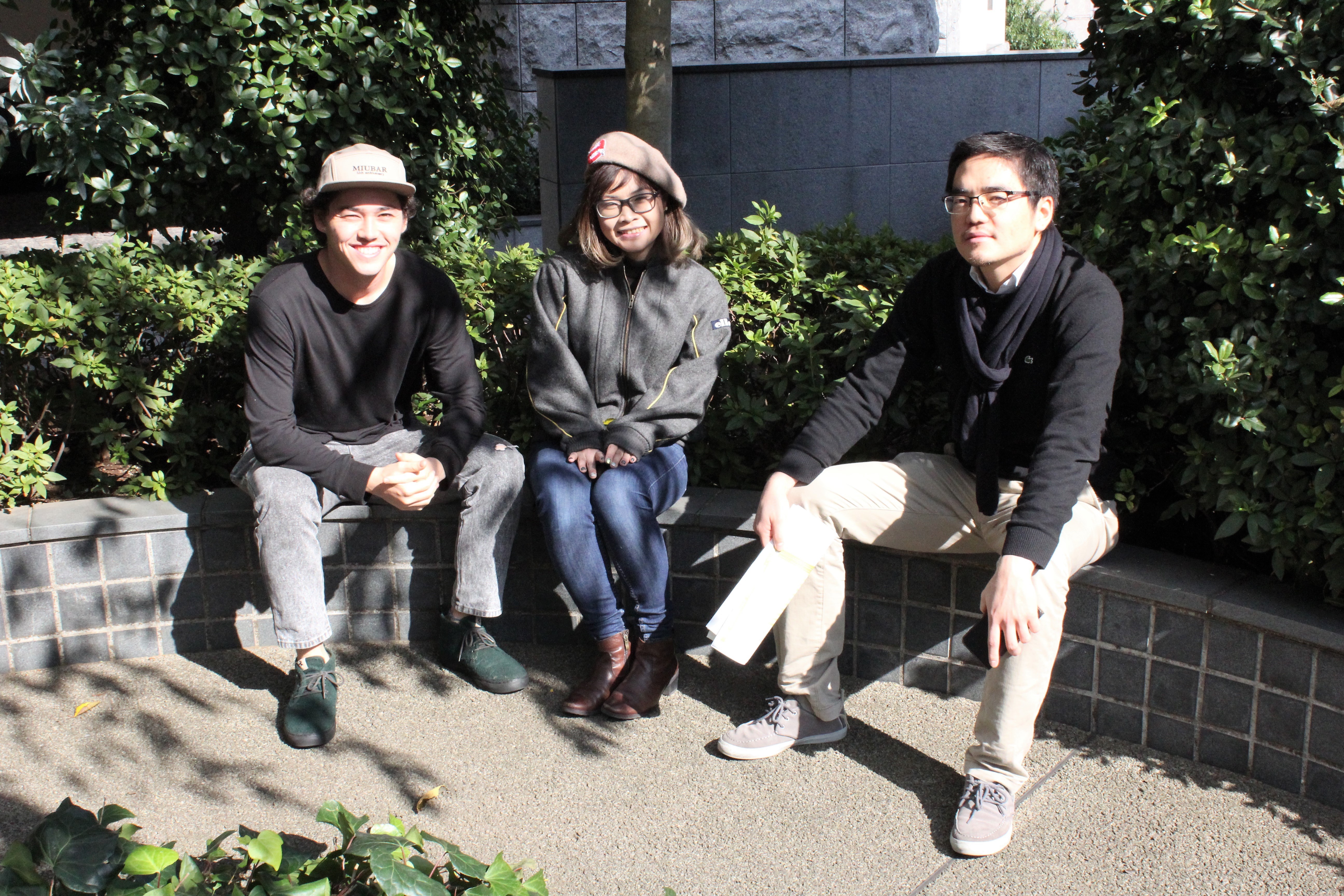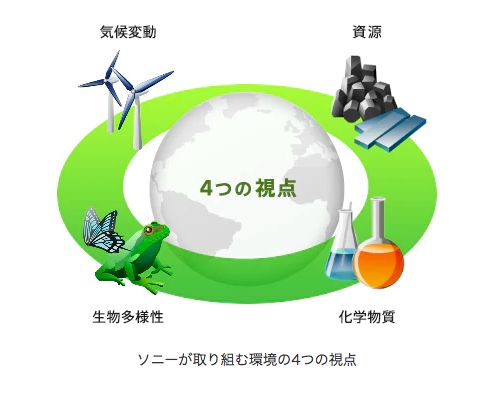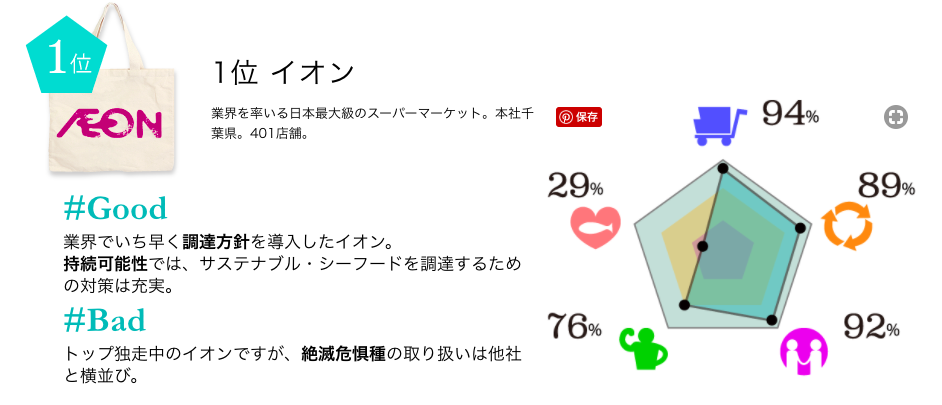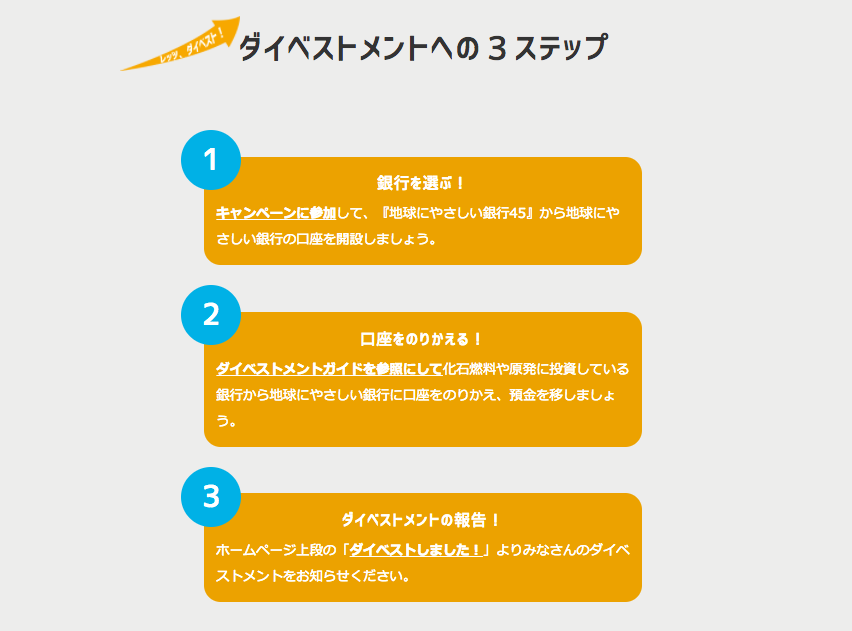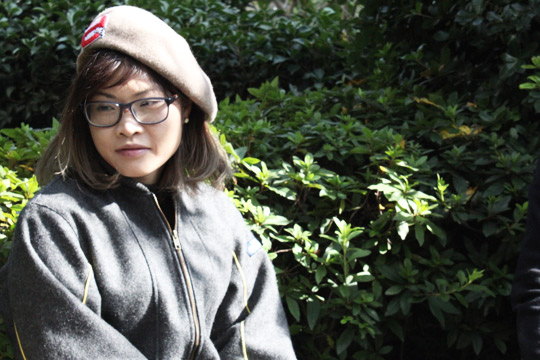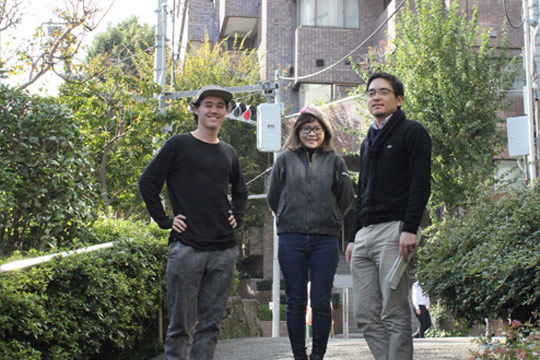“A Leading Role for Ordinary People. Social Activism That Anyone, Anywhere Can Do: That’s Divestment!”
The Divestment Story of the 350 Japan Team.
On November 6, 350 Japan commenced a month-long “Let’s Divest” campaign. 350.org Japan will be holding multiple events in Tokyo and Kamakura to spread the message that we can all contribute to building a sustainable future by making a conscious decision to move our money to “earth-friendly banks”. By doing so, we can pressure the big banks to stop investing in fossil fuels and nuclear energy companies and adopt environmentally responsible investment policies.
For this blog, we’ve asked 350 Japan’s three core members to tell us about their “divestment story” and thoughts on the campaign.
Q、Could you tell us which account at which bank did you choose to change to? Also, could you please tell us about the thinking behind the choice?
Shin: All of us chose to go with Sony Bank. In addition to being an “earth friendly bank” with no recorded investments in fossil fuels or nuclear energy, Sony has a business goal of reducing the electricity consumption of its operations and off-setting 100% of its CO2 emissions. Sony Bank had actually been proactively tackling these sorts of environmental problems since 2008, and in practical terms their international money transfer services were fairly good, so it was easy to switch. Additionally, not only the bank, but the parent company, Sony Corporation, itself has been committed to tackling climate change for a while, so that was one more reason to change banks.
Ian: I didn’t want to have all my eggs in one basket, so I have two banks; one for my day-to-day transactions and one for savings. My savings are going into a fixed deposit account at Æon Bank. I chose Æon because it’s easily accessible both from convenience store ATMs and from online services. Also, according a to a survey of supermarkets carried out by Greenpeace, Æon was noted for its contribution to sustainability, and in addition I saw in the news that they carried out projects with roots in local communities, so I felt like I wanted to be a part of a company like that by opening an account with them.
For my transaction account I use Sony Bank. After opening an account with them, they kindly send an email each week explaining how to use their online services and the account. Also, they send frequent portfolio rankings and have good rates for people who need to exchange foreign currencies.
Source: Japan for Sustainability
Marie: In addition to Sony Bank, I also opened an account with a local credit union. One reason is that it supports community projects in my area. The local economy in my area is struggling, so I was impressed by their activities contributing to the community, so I made a savings account with them.
Q、How long did it take to make a new account?
Ian: With Sony Bank, we were able to apply for an account straight away. Since we’re Japanese citizens and residents, we were able to open accounts with minimal information. Assuming everything goes smoothly, you can get your card from Æon Bank and Sony Bank in as little as two weeks.
Marie: Applying online took 15 minutes. Even though it was a busy period, I got my card in a month. I was also paying my gas, water and electricity bills by direct deposit from a big bank, so from calling my companies and submitting my forms it took about two months to set up my new account as my main bank.
Shin: Since I’m an Australian citizen I couldn’t complete my application online. First I had to apply online and wait about a week to get the forms I needed. From there, I had to get together copies of my ID for the application and send it back, which all up took about 2 weeks. From when I first applied the whole process took about a month.
Q、Was there anything you found particularly hard about the process of setting up an account?
Ian: It was the first time I had used an online bank, so in both cases I wasn’t used to the process for creating a “one-time password,” but once I’d done it the first time it was OK. Also, I wouldn’t exactly say I struggled with it, but if I had to say something that was hard, I think remembering transaction numbers and Sony member numbers and login passwords and one-time passwords all at once took a bit of time. But once I got used to it, it was convenient!
Marie: Not particularly. The process for changing my public utilities payments went on a bit, but that was about it.
Shin: I think if you follow the instructions on the bank’s site, the process is pretty simple. I think the hardest thing was choosing the right bank.
Ian: For someone like me who is impatient and doesn’t like reading, it was more fun to do it with a friend. It was a lot easier for me since I was able to check things with them as we went along.
Shin: At 350, we’re also making materials to make changing banks easier to understand. We’re putting out a fact-sheet called “I want to choose an environmentally responsible bank” that summarizes our list of 45 “earth-friendly” banks and details about their products, so that people can understand all the differences between online banks, credit unions and regional banks. (If you visit the official website at www.letsdivest.jp/en you can register and get all of this information for free)
Our “Divestment Guide” sets out the whole process comprehensively in three steps. “Choose a Bank.” “Transfer Your Account.” “Let Us Know.” Of course after making the decision to change, you will need to follow all of the processes of each bank carefully. I hope that this guide will help support those people who have made the decision that they do actually want to change. Also, we’re planning events where people who have decided to switch can meet and exchange experiences from the 6th of November to the 12th of December.
Q、Can you go into more detail about your thoughts on this campaign?
Marie: Our main objective is to have 100 people and 5 organizations make the decision to divest by the 12th of December. It’s the first time that we will be announcing figures for how many people are divesting, so it will be interesting to see what kind of effect it has.
Ian: I think there are a lot of people who do things like choosing renewable energy, riding a bike instead of driving or becoming vegetarian because they want to take action against climate change. I think this campaign is going to add “choosing a different bank” to that list of actions an individual can take.
Also, the “Let’s divest!” campaign is primarily driven by people who are already taking a leadership role by being active and volunteering for 350. It’s my hope that this will increase the number of people who are independently active and vocal about environmental issues in Japan.
I think modern consumers often, in a way, have their choices already made for them, so their own opinions and preferences aren’t really being expressed through those choices. I think as more people decide “I want to make conscious choices” about consumption, society will change more. That’s why with this campaign I want to spread the idea of “consciously choosing your bank.”

Shin: There’s a catchphrase for the divestment campaign. “If you change your account, you can change society.”When you’re just one person taking action you can feel very small, but when a lot of people make the same choice or take the same action, you can change the behavior of companies. If the demands of society can change, it can have an effect on the economy as a whole.
In order to do that, the first thing we have to do is get everyday people to change their behavior. It’s everyday people in their role as consumers who make demands on companies, which companies then respond to by changing their services and products. Through that power, everyday people can lead companies. I think that’s their role in social change. The aim of this round of “Let’s Divest” activism is to get together people who want to change to an Earth-Friendly bank and together communicate to the major banks that “we want you to conduct sustainable investment that’s conscious of climate change.”
In America, Europe and Australia beginning with universities and church-groups, the idea that you need to take action to stop behavior that goes against your values is becoming mainstream, and that’s helping to popularize divestment. In other words, in order to solve climate change, we have to think of lending and investment in fossil-fuel businesses, which are the major cause of the problem, as major threats to our future. This isn’t just about climate change, but I think we need financial institutions to adopt policies of not investing in military technologies like nuclear weapons, or in things like tobacco. If those kinds of demands are coming from the public, businesses will have to start providing services that meet those needs.
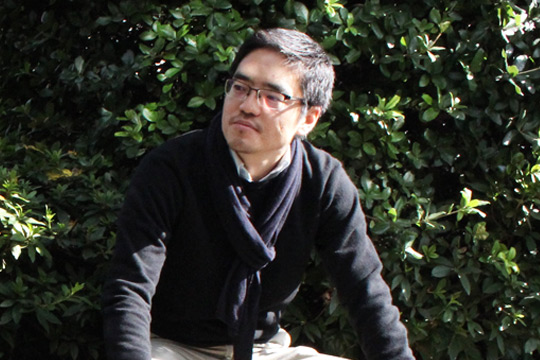
Shin: In California, public servants who are part of the pension program there have been making strong demands about how their money is being invested. I think it’s important for people to express their opinions not just as ordinary citizens but as employees as well. In Britain as well, the pension fund for employees of the Ministry of Environment has divested, in response to demand from its members. The European Union Parliament even passed a resolution that pension funds for 20+ member states have to take measures to tackle global warming. It’s precisely because there are movements among the general public that action is being taken on the legislative level. This kind of consciousness is already a part of the mainstream. We need these kinds of movements in Japan as well.
Marie: There are a lot of organizations that do outreach work with investors and businesses, but you get the impression that there are not so many groups focused on educating the general public. That’s why I see our role as being to deliver the message to business that issues like climate change are something that “the general public cares deeply about.”
Ian: Yeah, our activism is something that’s more focused on the “individual.”It’s important to get across the message that, yes, there are things you can do. The fact that the project is, at its core, being run by volunteers, plays an important role in that.
Shin: Conveying to businesses that “the public wants you to take this kind of action” is another role that 350 plays.
Marie: When I speak with Corporate Social Responsibility (CSR) managers, they tell me that it makes their role in their companies easier even if they just have relatively small petitions to show the relevance of undertaking socially responsible business practices. When we organize demonstrations in front of banks or shareholders meetings, even if it doesn’t make the news, it creates a conversation within those companies. In that way, people’s action can be heard directly.
Q、What concrete goals do you want to achieve through this campaign?
Ian: With these events, volunteers are going to be taking the lead in organizing them, which is a first for us, as well as something I don’t think you see that often in Japan generally. I think this proves that the seed has been planted for people that if they want to take action on something they can, and that they should be confident that they can change society. I hope that this removes some of the hurdles for people who want to get involved in activism.
Spreading activism isn’t something that just the three of us can do. An organization is really made of people. Even in businesses or in banks, at the end of the day, what changes of the behavior of people with the power to make decisions about divestment is other people. I think it would be good if we could help develop people who can do that, and so bring about a positive cycle of change.
Shin: In addition to that, this is actually the first time that individuals and organizations in Japan will publicly commit to divest. My hope is that this will contribute to other businesses and organizations that care about social and environmental issues taking action on the issue and create a conversation in the financial community about their responsibility to act on climate. If a lot of groups come together on this, I think the effect on society overall will be greater. I also want us to strengthen our cooperation with businesses that are active on a national scale.
Marie: In 2018 I think there will be a lot of attention on the issue of coal. I hope that the hundred people we hope to get to take action on divestment will continue on and support us in the movement to stop coal-fired power generation.
Of course, advocating directly to businesses and governments is important. But it is banks after all that lend money to coal-fired power stations, so I hope that we can work together to stop the source of funding at the base of their operations. Because of that, I think activism that has deep roots in the community is important.
Shin: Divestment is a type of activism that you can do anywhere, whether you’re in Tokyo or in regional areas. Right now there are plans to build new coal-fired power plants across Japan. One way that we can influence those companies is by pushing for divestment from companies that support new coal plants. Our goal is to create a new avenue for people to take action on climate change.
Marie: The goal underpinning 350 is “to create a movement.”To take an example from overseas, a major environmental movement was born from plans to build a new coal mine near the Great Barrier Reef. If we want to create a social movement, I think it’s a good idea to adopt methods that have had results abroad.
Shin: It’s often said that Japan is a great nation of “savers”. That means that Japan’s deposit holders have power. Precisely because of that, they have the ability to bring about change. You need capital to build a power-plant. At the moment there is a movement emerging to put control over electricity development in the hands of the people. I think we also need a similar movement to put control of capital in the hands of the people.
As part of the “My Bank My Future” campaign we had 1000 people sign our petition. The estimated worth of their savings is around 3.3 billion yen (approx. 29.3 million USD). With that amount of money it you could build a small community power-plant. In Europe it’s becoming normal for power-plants to be owned by the general public. That’s something that at 350 we want to encourage.
Share!↓
Go back to【Let’s Divest Homepage】
Shin Furuno:
Shin currently heads the 350.org Japan office. Born January 31, 1983, in Chiba, Japan, Shin moved with his parents to Brisbane, Australia, when he was five years old. He graduated from Queensland University with Bachelor of Arts and Bachelor of Social Science. In 2011, he received his Masters Degree in Climate Change from the Australian National University. Shin worked at the Australian government’s Department of Climate Change (now Department of Environment) from 2008-2014. While there, Shin worked on international cooperation projects to reduce greenhouse emissions and enhance efforts to adapt to climate impacts. Shin has also worked with a variety of NGOs and as an independent consultant, tackling international development and climate change measures in Panama, Samoa, East Timor and Cambodia. In April 2015, Shin became the founding member of 350.org’s Japan office, dedicated to working on climate change and global environmental issues.
Shin has been featured in the Asahi Newspaper as a prominent climate change activist (May 10, 2016 issue). Academic publications: (Community-Based Adaptation to Climate Change in Timor-Leste)」(2014, LAP Lambert Academic Publishing).
Ian Shimizu-Pughe:
Ian is an field-organizer at 350.org Japan. Ian was born in Osaka and raised in Tokyo. He has a Japanese mother and a British father. After graduating St.Mary’s International School in Setagaya Ward, he went on to obtain his undergraduate degree from International Christian University. Since childhood Ian has had a strong interest in the natural world, spending his summer holidays in Okinawa working as a snorkeling instructor in Ishigakijima and Miyakojima Islands. He became more heavily interested in environmental issues during his time at ICU, spending his time outside of classes getting involved in environmental activism. After meeting Shin Furuno, he started working for 350.org Japan as a field organizer in September 2015, which he continues to do to the present day.
Marie Tanao:
Marie is 350.org Japan’s PR manager. She was born April 13, 1988 in Aichi, Japan. Between the ages of five and fourteen she was raised in British Columbia, Canada and West Virginia, USA, as a result of her father’s work. In 2011 she graduated from Aoyama Gakuin University’s Department of English. While studying at AGU, Marie participated in the Convention on Biological Diversity’s Conference of the Parties 10 in Nagoya, Japan, working on government policy recommendations. After graduating, Marie worked for the Mainichi Shimbun Newspaper in their Washington DC office. She carried out research in areas spanning politics, economics, and foreign relations. Marie is a member of the White House Correspondents’ AssociationIn November, 2015 she became the PR manager of 350.org Japan and moved to Tokyo. She continues this role to the present day. She is also a contributor to the online magazine AlternaS.

